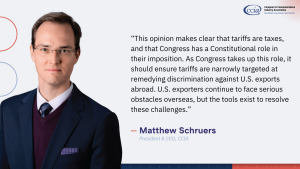Washington – During the U.S.-Mexico-Canada Free Trade Commission meetings in Phoenix, Arizona, on Wednesday, the Office of the U.S. Trade Representative (USTR) again raised the issue of Canada’s discriminatory and burdensome digital services tax (DST). The proposed DST, which is a part of Bill C-59 currently nearing the final stages before passage and enactment, would disproportionately harm U.S. companies, undermine digital exports, and harm Canadian innovation. The DST would cost U.S. companies billions of dollars and could lead to thousands of job losses.
The Computer and Communications Industry Association (CCIA) has previously raised the alarm about Canada’s approach, which contravenes international consensus surrounding the OECD/G20 Two-Pillar Solution to taxation issues, and filed comments with the Canadian government. USTR has previously launched investigations of similar DSTs abroad under Section 301 of the 1974 Trade Act to ensure U.S. exports are protected.
CCIA has advocated for digital trade rules that strengthen the global economy for over 50 years.
The following can be attributed to CCIA Vice President of Digital Trade Jonathan McHale:
“We appreciate USTR’s efforts in pushing back against Canada’s proposed digital services tax, and its appreciation of the harms that would materialize for U.S. exporters if this Bill were enacted. Given its likely near-term passage, we are fast approaching the moment at which action will be urgently needed. USTR recently pledged before Congress that the agency is ‘prepared to use the tools’ available in response to Canada continuing down this path. With Parliament set to act, we urge USTR to prepare a forceful response to be ready on Day 1 of Canada’s enactment of this law.”



